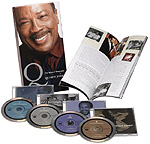
Collection shows genius of Quincy Jones
|
This review first appeared in the January 19, 2002 edition of the American Reporter.
Witness to and participant in most of the popular musical trends of the past half-century, Quincy Jones is a bit of a throwback and a definite modern rarity – a music producer with a real passion for making good music.
Like his mentors and friends Frank Sinatra and Count Basie, Jones has become as much an icon, a symbol, as a man. Heck, let Cher and Madonna get by with just one name – Jones is held in such exalted esteem that he's popularly known by just a single letter: Q.
But who else has a resume or list of accomplishments to rival Q's? Arranger for the Basie band, arranger and producer of Sinatra's recordings with the Basie outfit in the early '60s. Discoverer and manager for '60s teen pop sensation Lesley Gore. Composer of the TV themes for "Sanford and Son," "Ironside," and "The Bill Cosby Show." The man who turned Michael Jackson from youngest member of the Jackson 5 into global superstar.
Okay, as that last entry points out, Jones may have to answer to the rest of us on a few points, but a new four-disc "musical biography" of Jones illustrates the range of his influence, as well as the breadth of his genius.
And if Michael Jackson has turned himself into a pathetic self-parody best suited for late-night talk show fodder, well, that's not Jones' fault – in fact, Jackson's "Off the Wall" and "Thriller" albums were – are – remarkably cohesive pop masterpieces, unlike anything Jackson did before or since working with Jones.
Besides, Jackson was only a small part of Jones' success – for a black man in the early 1960s to discover and manage a young white girl's career was unthinkable. And yet it was Jones who produced Gore's hits "It's My Party (and I'll Cry if I Want To)" and "You Don't Own Me."
The other artists he's arranged for and/or produced would fill any hall of fame you might care to build: Miles Davis. Ella Fitzgerald. Ray Charles. Aretha Franklin. Paul Simon. Chaka Khan. George Benson.
Tracks from his collaborations with all these artists and more is included on "Q: The Musical Biography." The discs are organized more by theme than chronologically – which makes for better listening.
The first disc is Jones' jazz material, ranging from his early stints as trumpet player with Lionel Hampton in the early '50s through his work as arranger for Clifford Brown and Art Farmer, Cannonball Adderley, Sarah Vaughan, Billy Eckstine, Ella Fitzgerald and Count Basie. This disc closes out with a couple cuts from the 1991 Montreaux Jazz Festival, a previously unissued track by Ray Charles and the other by Miles Davis, in his final visit to Montreaux.
Disc No. 2 is titled "Gone Hollywood," and traces Jones' history of composing theme songs for TV and films. Interestingly, the first track, "Soul Bossa Nova," was recorded in 1962, and later used as the theme for the hit parody "Austin Powers: International Man of Mystery." Also on here are the above-mentioned TV themes, plus the theme to "In the Heat of the Night" (the 1967 film with Sidney Poitier and later a TV series with Carroll O'Connor), plus "Miss Celie's Blues" from "The Color Purple."
"Hit Man" is the title given the third disc, and it opens with Sinatra's 1964 hit "Fly Me to the Moon" (which was used as the closing song in Clint Eastwood's 2000 film, "Space Cowboys"). Michael Jackson, the Brothers Johnson, Paul Simon, Chaka Khan, Aretha Franklin and Donna Summer also populate this disc.
The last disc is dubbed "The Dude Throws Down," and is culled from Jones' own albums through the years – projects on which he wasn't producer or arranger, but the leader. The material ranges from the immediately memorable ("Killer Joe," "Stuff Like That") which were fairly significant hits, to the interesting but probably unknown to most listeners (covers of "Takin' it to the Streets" and "Let the Good Times Roll.")
As with everything on this disc, Jones' own material as leader reflects both a classy sense of style and grace and a deep appreciation for America's many streams of musical heritage. Fully immersed in jazz, Jones also has respect for his nation's country, blues, bluegrass and gospel traditions. Jones has, throughout his career, taken these many threads and woven them into new forms and patterns, tying past and future together.
Wherever popular music ends up down the road, the path it takes to get there will have been laid in large part by Q.
